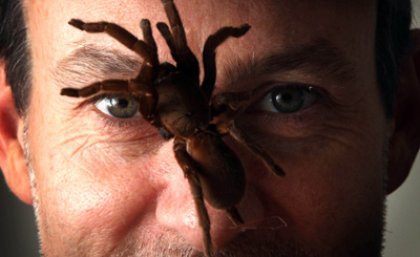
The University of Queensland’s Institute for Molecular Bioscience (IMB) has been awarded $4 million in funding from the Australian Research Council (ARC), including $325,000 for a project that will use spider venom and fungi to stop insects from spreading disease.
UQ Professor Glenn King has spent nearly two decades studying spider venom to develop environmentally-friendly insecticides that target crop pests including ongoing collaborations with industry partners.
In an extension of this research, Professor King will use the ARC Discovery Grant to investigate methods to prevent the spread of human diseases by insects such as mosquitoes.
“Insects transmit a wide variety of human diseases including malaria and dengue, with mosquito-borne diseases causing over 1 million deaths each year,” Professor King said.
“Insects are increasingly becoming resistant to current insecticides and increased environmental standards have made it more difficult to register new insecticides.
“We will use this ARC funding to develop an eco-friendly approach to controlling human disease spread by using natural insecticidal compounds from spider venom and delivering them to the target insects using parasitic fungi.”
Bacteria, viruses, microbes and fungi all have the potential to infect insects and serve as vehicles to deliver insecticidal compounds.
Of these, fungi have the distinct advantage that they can infect insects through contact alone, rather than having to be eaten first.
The major disadvantage of using fungi to deliver insecticidal compounds is the length of time it takes to kill the insects, typically a week or more.
In collaboration with Professor Raymond St Leger at the University of Maryland, Professor King and his lab engineered strains of fungi that nearly halved the amount of time it takes to kill 50 per cent of insects in a test area.
They also found that these fungi strains reduce the amount of blood feeding that insects undertake.
“If mosquitoes do not blood feed, they lose the ability to transmit disease, so any reduction in feeding that is caused by fungal infection is just as important as increases in mortality,” Professor King said.
Professor King’s collaborator, Dr Laith Yakob of UQ’s School of Population Health, used mathematical modeling that simulated malaria-endemic regions in Africa to test the likely effectiveness of this approach in controlling disease.
Dr Yakob’s modelling suggested the combined reduction in mortality and feeding propensity caused by the engineered fungus is enough to completely eliminate disease transmission.
Professor King and his team will use the funding to identify more active compounds from spider venom that may act as insecticides and test them against mosquitoes as well as kissing bugs that spread Chagas disease.
They will then engineer the most promising of these compounds into strains of fungi and test how effective they are in stopping mosquitoes and triatomine bugs from spreading disease.
“We would be interested in talking to potential industry partners who could then take this research to the market with the goal of saving lives in areas populated by mosquitoes and triatomine bugs,” Professor King said.
The Institute for Molecular Bioscience (IMB) is a research institute of The University of Queensland that aims to improve quality of life by advancing personalised medicine, drug discovery and biotechnology.
For more information, to donate to or collaborate with Prof King’s lab, please call (07) 3346 2132 or email advancement@imb.uq.edu.au
Images High resolution images can be downloaded here. This link expires on 11 December 2012.
Media contact: Bronwyn Adams, IMB Communications Officer: 0418 575 247, 07 3346 2134, b.adams@imb.uq.edu.au
.jpg)


